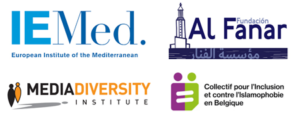There’s a lack of women voices in articles published in newspapers in Spain and Belgium that primarily discuss Muslim women and their roles in society, being female voices rarely called on for testimony and depicted mainly with a worrisome degree of superficiality.
This is one of the main highlights of the fist period of analysis carried out by the project MAGIC during 5 months (between May and September 2021) of a selection of Spanish and Belgian newspapers. The project’s partners in charge of this work, Media Diversity Institute in Belgium and Fundación Al Fanar in Spain, have used the methodology developed by the project to monitor journalistic discourse on Muslim communities and Muslim women in particular. The results of this initial phase of the monitoring have been published in the first two National Dispatches.
The three Belgian newspapers monitored are Le Soir, La Dernière Heure, and Het Laatste Nieuws, while the three Spanish are El País, La Razón, and ABC.
In the case of Belgium, two topics were overwhelmingly covered: the case of a woman who was discriminated against in her employment because she wore a headscarf and the case of a governmental commissioner for the Institute for the Equality of Women and Men, a post from which she quickly resigned after a wave of online attacks and political backlash.
Though both dispatches refrain from drawing definitive conclusions before completing the 15 months monitoring period, MDI highlights in its report that “when Muslim women are the objects of discussion (as opposed to the agents and producers of their own lives and narratives), they are primarily discussed through the lens of politics. Their rights, their lived experience, and the inequalities they suffer are perceived as far less important than the positions of politicians discussing them.”
In fact, MDI adds that “the presence of so much political coverage in the Non-Muslim Women category [of the methodology] (and, to a lesser degree, Undefined Women) implies an intersection of discriminations, a potential indicator of exactly the gendered islamophobia MAGIC aims to curtail.”
The media analyses and their findings will be taken into consideration when designing the toolkits “Speak up for diversity” and “Report diversity” of the project.




